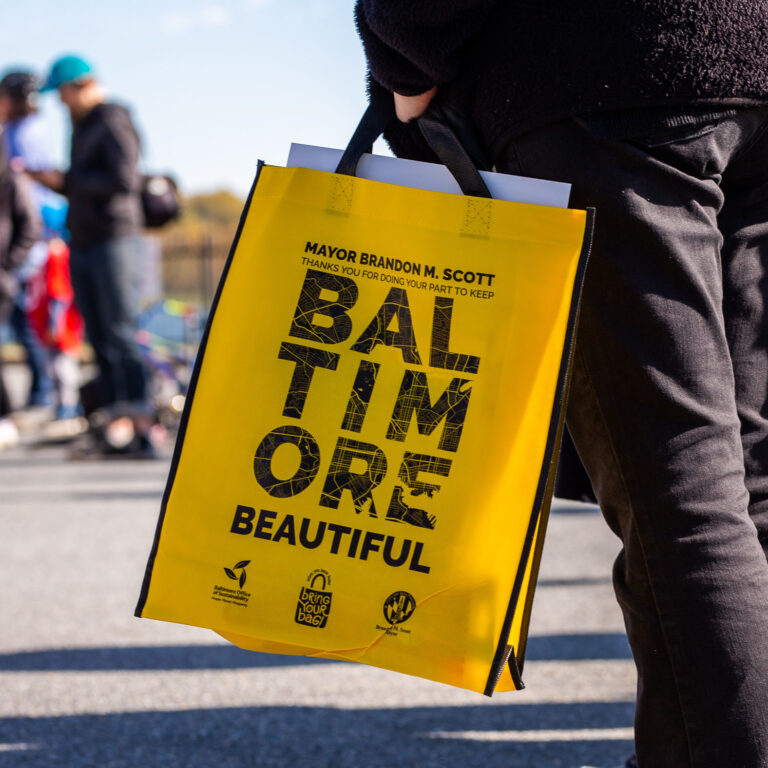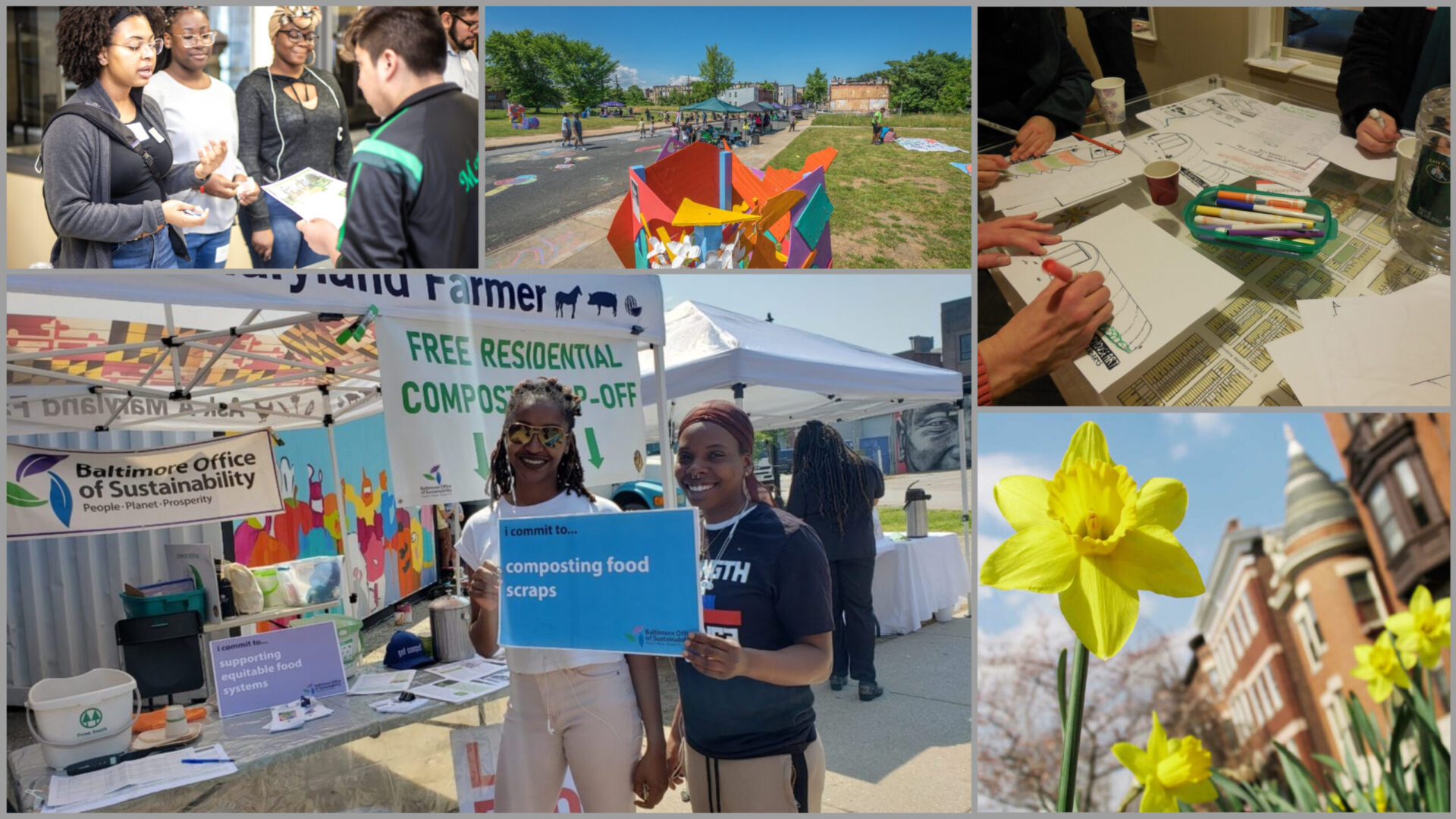
Bag Ban Links for Retailers
Baltimore City has implemented the Comprehensive Bag Reduction Act (Baltimore City Code Article 28 § 32-1, Article 7 §62-1), banning single-use plastic check out bags at the point of sale, pickup, or delivery. This means that Baltimore businesses must charge a minimum of $0.05 for each alternative bag distributed at check out, of which $0.01 must be remitted to the city.
Retailers must register for a Tax ID and pay the $0.01 surcharge electronically. The portal for Tax ID registration and payment is available here.
We have created graphics that you can use to print stickers of different sizes, to place on your windows and/or at point of sale, so that your customers are made aware of the city law prohibiting the use of plastic bags at point of sale.
Baltimore City Plastic Bag Ban Frequently Asked Questions (FAQs):
To Whom Does This Apply?
- supermarkets;
- convenience stores;
- corner stores;
- restaurants;
- shops;
- gas stations; or
- other sales outlets.
Which types of bags are banned?
Any plastic bag under 4 mils thick given/received at the point of purchase.
What type of bags are allowed?
Paper bags, compostable bags, and plastic bags that are 4 mils or thicker. Compostable bags are ones that: (i) meet the ASTM D6400 standard specification by a recognized verification entity; and (ii) are capable of undergoing biological decomposition. Retailers distributing these types of allowable bags must charge a fee of at least $0.05 to the consumer.
Are there exceptions?
As per page 4 of the legislation, the ban “does not apply to a plastic checkout bag solely used to contain:
- fresh fish and fresh fish products;
- fresh meat and fresh meat products;
- fresh poultry and fresh poultry products
- otherwise unpackaged fruits, nuts, or vegetables;
- otherwise unpackaged confectionery;
- otherwise unpackaged fresh cheese;
- otherwise unpackaged baked goods;
- ice;
- foods and goods obtained at a farmers’ market;
- prescription drugs obtained from a pharmacy;
- newspapers; or
- dry-cleaned goods.”
Does this mean grocers and retailers can’t supply any bags to customers?
When providing any single use alternative bags, including paper bags, retailers must charge a fee of at least $0.05 to the consumer.
Are there exemptions for FSP, WIC, or SNAP users?
Users of FSP, WIC, or SNAP are not exempt from the ban OR the $0.05 surcharge for alternative bags. Only certain products are allowed on voucher or electronic benefits transfer purchases, making it extremely difficult to include extra $0.05 bag charges in those allowances.
What is required of business owners and retailers?
The Act requires that businesses collect a surcharge of at least $0.05 for alternative bags provided to customers (such as paper or compostable bags). Of the amount collected, $0.01 is to be paid to the City of Baltimore. Businesses may keep the remaining amount.
How can retailers avoid penalties and interest?
This video demonstrates how to use the Bag Surcharge payment portal.
To report the number of bags they distribute and pay the corresponding surcharge, business owners and retailers must register for a Tax ID and pay the surcharge electronically. The portal for Tax ID registration and payment is available here.
Retailers must report the number of checkout bags sold by the 25th of the following month. Small retailers who provide less than 300 checkout bags must report “0” for the months when the number of checkout bags provided is less than 300. Once the total number of bags provided over these months exceeds 300, retailers must report the total number of bags sold and pay the required surcharge. Retailers should track the number of bags each month to file a report the following month.
For example, if a retailer sold 100 bags in January, 100 bags in February, and 150 bags in March, they should report “0” for January and February but report 350 bags for March (total bags sold from January to March). If a retailer has been reporting “0” and the total bags sold over several months is more than 300, they need to report the total number of bags sold.
What happens if retailers do not comply?
The Act authorizes certain exemptions and imposes certain civil and criminal penalties. Fines start at $250, then $500 and $1000 for repeat offenders.
What if I am not able to submit my payment electronically?
Electronic payments are preferred and strongly encouraged for faster processing.
If you choose to mail the payment, take the following steps:
- Report the number of bags and calculate the required payment using the online portal and print a copy of the filing to include with your payment.
- Make the check payable to Director of Finance
- Include your bag tax account number and filing month and year on the check memo (Example: B-000-001/February 2023).
- Mail your payment to:
City of Baltimore Bureau of Revenue Collections
Abel Wolman Municipal Building
200 North Holliday Street
Baltimore, MD 21202
Where can I get more information about submitting my payment or check the status of a payment I have submitted?
Website: Bureau of Revenue Collections
Website: Online Payments and Account Lookup
Website: Payment FAQs
Video: How to submit your bag payment
Email: BaltimoreCityCollections@baltimorecity.gov
Phone: (410) 396-3000
Q: My company already charges at least $0.05 per bag, do we still need to charge the customer an additional $0.05 for the surcharge?
A: No, grocers do not have to charge an additional $0.05 if they are already charging for bags. However, all retailers and grocery stores will have to remit $0.01 to the city, per the ordinance.
Q: If a retailer has several stores in the city, can they create one Tax ID for these locations and file all bag surcharges under the one account, rather than having separate accounts for each location?
A: Per our Department of Finance, chain retailers should request tax ID per location and remit taxes and reports to the City by location.
Q: Are paper bags an acceptable alternative to provide customer with?
A: Alternative bags can be supplied to customers including paper and compostable bags, or plastic bags over 4 mils.
Q: Is the surcharge subject to MD sales tax?
A: The $0.05 fee is for the use, not the sale, of the checkout bag, and is not to be included in the calculation of sales tax for a transaction.
For more information
Visit the Baltimore City Council www.baltimore.legistar.com to find the Baltimore City Comprehensive Bag Reduction Act. You can also reach out to us by email at sustainability@baltimorecity.gov.

